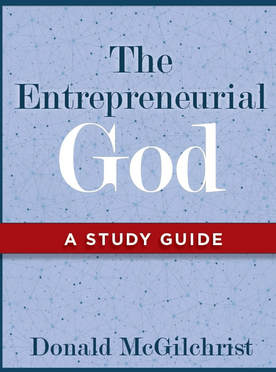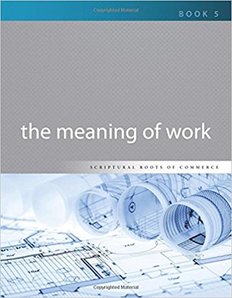 GEN Desk is excited to share the Global Commerce Network's release of its new book titled The Entrepreneurial God, written by Donald McGilchrist. The book can be purchased on Amazon. McGilchrist shows, through a study of the Scriptures, God as the grand innovator who, motivated by love, initiated the first "start-up" – our world. Despite this reality, the philosophical wedge driven between what our culture deems "sacred" and "secular" makes it difficult for business leaders to think about entrepreneurship and innovation through a theological lens. As a result, we miss out on the grandeur of how our enterprises fit within God's overarching purposes for the world. Our perspectives leave us with a narrow view of what it means to be entrepreneurs. The Entrepreneurial God helps us expand our vision and learn from the model of the grand innovator. We see that our enterprises can and should contribute to the shalom, or well-being, of our communities, our economies, and our workers. Donald McGilchirst, a founder of GCN, was born in London, England. He holds an MA from the University of Oxford. He worked for ten years in business in the UK before serving as an international vice president of The Navigators in the US. In this capacity, he focused on cross-cultural studies, communications, and international strategy. In addition to The Entrepreneurial God, he has authored several studies on the cultural and biblical significance of commerce and enterprise, with a focus on our daily work in the world, including The Meaning of Work (2015) and other books in GCN's six-book series titled Scriptural Roots of Commerce. Glenn McMahanGCN Initiatives
0 Comments
Extremely thought-provoking Bible Study (part of the Scriptural Roots of Commerce Series) regarding the meaning of work to help users understand and discover God-created purpose of work. The meaning of work is a critical foundation for any missional enterprise. "We spend most of our lives working. Do our jobs mean anything to God? The Meaning of Work offers a hopeful answer to that question. Early in the story, we discover a God who works with passion and love, and who has designed us to work. We explore the truth that all work done in faith is sacred and purposeful. The study then helps us discover how our professional lives can be integrated with God’s work to restore a broken world. It closes with an investigation of physical and spiritual rest in the context of our stressful times."
– Global Commerce Network Often there is a chronic divide between the "sacred" and the "secular." But Monday through Saturday matter too... we will feel disconnected and fractured. How is your work related to your worship of God? Is it at all? As missional entrepreneurs, there needs to be a connect. Otherwise the toil of every day tasks will feel like a distraction rather than the context of where we worship God and expect His Kingdom to advance.
Why does God’s presence in the workplace matter? The Great Commission challenges all of us, “Go and make disciples of all nations, baptizing them in the name of the Father and of the Son and of the Holy Spirit, and teaching them to obey everything I have commanded you” (Matthew 28:19-20, NIV). The average adult is awake 16 hours a day: one hour to prepare for work, 30 minutes each driving to and from work, eight hours at work. That’s already 10 out of 16 hours. Let’s contrast that with the time we invest at church. For some people, it’s just an hour a week. The point? The majority of our life is invested in preparation for work and in doing it. That’s why God’s presence in the workplace matters. God knew the struggle we were going to face in the workplace, so throughout Scripture He gave us clear instruction, warning and encouragement about our work. Instruction: “Whatever you do, work at it with all your heart, as working for the Lord, not for men, since you know that you will receive an inheritance from the Lord as a reward. It is the Lord Christ you are serving” (Colossians 3:23-24, NIV). Warning: “No one can serve two masters. Either he will hate the one and love the other, or he will be devoted to the one and despise the other. You cannot serve both God and Money” (Matthew 6:24, NIV). Encouragement: “Do not worry about your life, what you will eat or drink; or about your body, what you will wear. Is not life more important than food, and the body more important than clothes?” (Matthew 6:25, NIV). The workplace offers great opportunities to encourage those who know Christ and to witness to those who don’t. I have heard many arguments about why God does not belong in the workplace. There is the legal argument. The “it might offend someone” argument. The “what gives you the right?” argument. I have even heard the “it might scare off customers or employees” argument. But Jesus said, “I tell you, whoever acknowledges me before men, the Son of Man will also acknowledge him before the angels of God. But he who disowns me before men will be disowned before the angels of God.” (Luke 12:8-9, NIV). If I claim Christ, if I accept His offer of grace, I cannot leave Him in the car and spend the bulk of the day pretending I don’t know Him. Think of how Peter denied Jesus–is that any different from our daily failure to claim Him in the workplace? The marketplace matters because God offered us His Son, the greatest Gift in history. And our acceptance of that Gift came with instructions: Every one of us is called to participate in the Great Commission. Every day in the workplace we have the opportunity to share that Gift with others. Be bold. Live your Christian faith every day. If we do that, we will affect the lives of many in the great harvest field that exists in the workplace. God's Presence in the Workplace
Originally published by Pat Flood, September 24, 2004, at www.billygraham.org. Recent notes from Jerry White's presentation on, "A Minimalists Guide to Life at Work."
The bottom line for those who like to know the conclusion first! Our work needs: Calling, Excellence, Competence, Faithfulness (work hard), and Attitude. The Theology of Work: From the beginning: "The LORD God took the man and put him in the Garden of Eden to work it and take care of it.” Genesis 2:15 (NIV) Commands and Limits: "Six days you shall labor, but on the seventh day you shall rest; even during the plowing season and harvest, you must rest.” Exodus 34:21 (NIV) New Testament View: "Make it your ambition to lead a quite life, to mind your own business and to work with your hands, just as we told you, so that your daily life may win the respect of outsiders and so that you will not be dependent on anybody.” 1 Thessalonians 4:11-12 (NIV) No work is secular: "Whatever you do, work at it with all your heart, as working for the Lord, not for men.” Colossians 3:23 (NIV) Some specifics: "For you yourselves know how you ought to follow our example. We were not idle when we were with you, nor did we eat anyone’s food without paying for it. On the contrary, we worked day and night, laboring and toiling so that we would not be a burden to any of you. We did this, not because we do not have the right to such help, but in order to make ourselves a model for you to follow. For even when we were with you, we gave you this rule: ‘If a man will not work, he shall not eat.’ We hear that some among you are idle. They are not busy, they are busybodies. Such people we command and urge in the Lord Jesus Christ to settle down and earn the bread they eat.” 2 Thessalonians 3:7-12 (NIV) Key Concepts:
Pinpricks for Our Thinking:
Dig in for yourself! What does God reveal to you about himself, you, and work? – Gen Desk Director |
Categories
All
Archives
March 2020
|

 RSS Feed
RSS Feed
